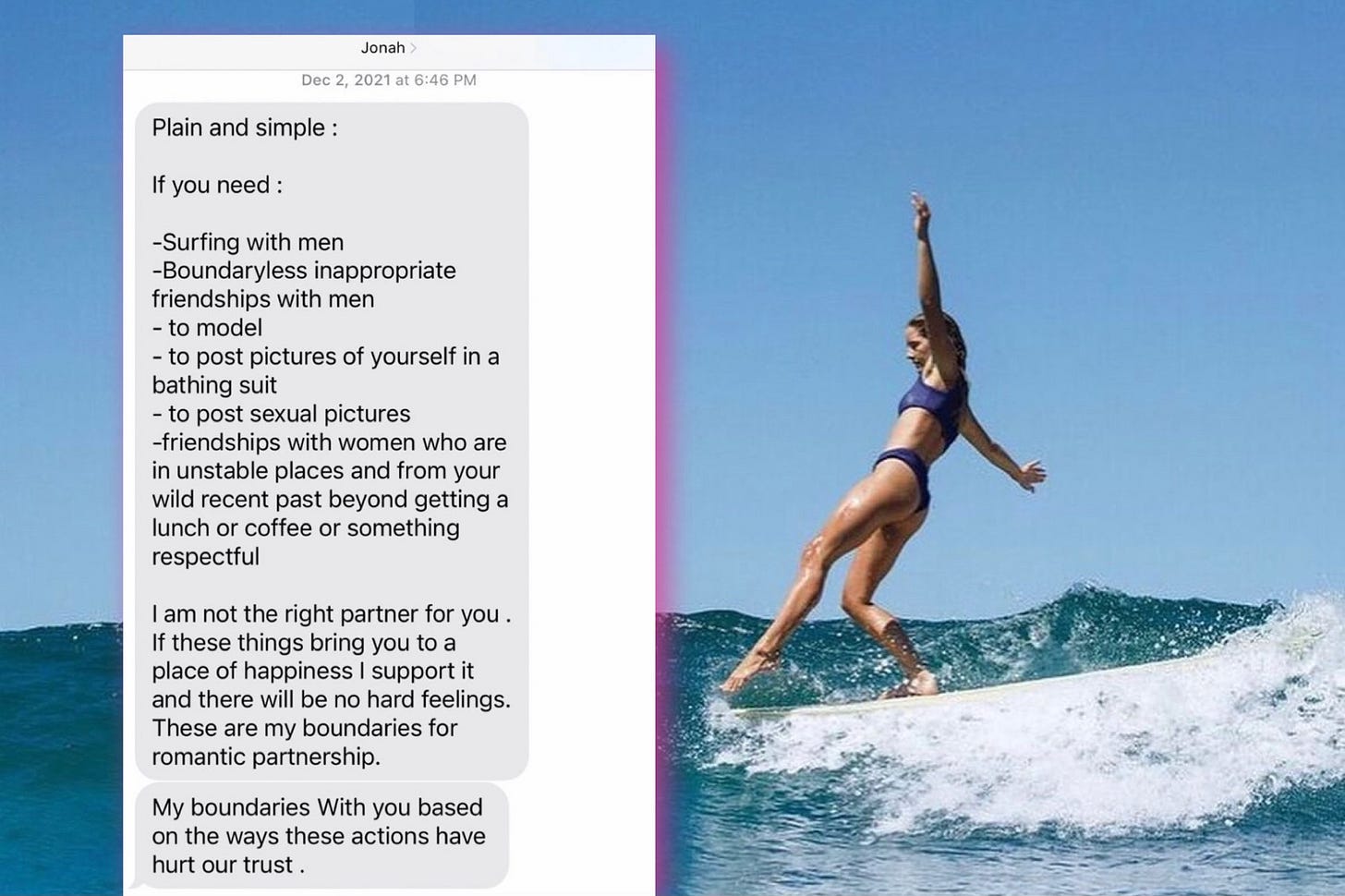Using ‘therapy speak’ could be making others less empathetic towards us
You might call yourself "an empath", but it's not helping people empathise with you...
If you enjoy this newsletter, consider pressing the ❤️ button at the end of the article. It allows more people to find my work!
Look, I know we’ve discussed Therapy Speak to death. Most of us became more than a little turned off in 2023 after seeing Jonah Hill’s messages to his then-girlfriend, professional surfer Sarah Brady, after he listed modelling, taking pictures in a bikini, and surfing with men, as “boundaries” that she mustn’t cross in order to be with him.
And it’s not just A-listers who now throw these kinds of words around to mask unkind, lazy or controlling behaviour. Friends of mine have felt hurt when people have asked how they are, only to be told “I don’t have the space to hold your trauma” when the answer is anything less than “Good, thanks!”
I think we’ve long outgrown the idea that going to therapy automatically makes you a great person. In the case of Jonah Hill, you might argue that therapy can make a person much much worse. As an evergreen Tweet once said: “The worst person you know is in therapy right now being told their actions are valid.”
Therapy doesn’t absolve you of bad behaviours. It doesn’t wash you clean.
There’s lots of great work out there already about how Therapy Speak can make us - the speaker - less empathetic, likening friendship to “emotional labour” or speaking to people as though we work in HR. But I’d go a step further and say that it makes those listening to us less empathetic, too.
In Katy Perry’s recent interview on the Call Her Daddy podcast, we were (rightly) more focused on her doing conversational gymnastics to avoid questions about her working with known abuser Dr Luke to notice much else. Perhaps because I was already irritated with her over this, when she began to use Therapy Speak to describe basic, everyday interactions, I’d had enough. Oh shut up, I scoffed at my phone screen.
When asked about how her partner Orlando Bloom acted during a temporary breakup, Perry replied, “He was boundaried.”
Aside from the fact that “boundaried” isn’t a real word when used in this context, what irked me more was how clinical it made her sound. What happened to saying “He was great, he gave me space,” or “We stayed in touch, but he didn’t overdo it.” Similarly, Perry used the phrase “doing the work” over and over again in relation to raising her daughter and working on her marriage. After a while, such terms begin to sound almost satirical. What work? What are we even talking about anymore?
There’s a reason licensed therapists won’t typically use words like “gaslight”, “toxic” or “boundaries”. It’s because these words don’t connect us as humans—we don’t fully understand each other when we use them, even if we think we know what they mean. Instead, therapists will try to mirror the everyday language used by their clients.
As Dr Sheri Jacobson, a retired psychotherapist with over 17 years of clinical experience, said in an interview with Stylist: “Therapy Speak is language that people believe therapists are using [but] I really can count on one hand the number of times that any of these terms have been used in a session…It's an empathic relationship, so you're not going to foist words on a client that are new to them, and then have to explain what they mean. It's easier to explain things in much more basic language.”
For someone like Katy Perry, her fame and clout will probably ensure that people are always listening to her, no matter what words she uses to express herself. But for people who don’t have stardom to bolster their voice, Therapy Speak may actually be doing more harm than good when it comes to being understood by others.
It’s easy to latch onto words that we hear online—and the online world is full of Therapy Speak. I’m definitely guilty of it. I’ve used the word “triggering” when I didn’t really mean it. I’ve used the word “narcissist” to describe someone who was just a bit of a brat. But these Very Online words have never helped me explain myself better than everyday, conversational language.
“It’s easier to call an ex-partner a gaslighter than admit that they shattered our hearts. It’s easier to call a mean friend a narcissist than it is to admit they made us feel belittled, fragile and upset.”
I’ve been a copywriter for the last eight years, writing for companies like Google, Aston Martin and Tattoodo. One conversation I often have with the more corporate clients revolves around simple language. A lot of companies still think that using convoluted words and terms makes them sound smarter, when it actually does the opposite. Writing for a brand like Google requires almost no technical jargon—because Google knows what it’s doing. The simpler the voice, the more you connect with people. And I’d argue it’s the same for human-to-human interactions.
Maybe - like those corporate businesses - we use Therapy Speak to make us sound smarter. But there are other theories, too. Dr Jonathan Shedler, a psychologist at the University of California, said in an interview with the Guardian, “[Humans are] masters at distancing ourselves from difficult aspects of emotional life…One way we distance ourselves is through words. What we’ve got now is this kind of pop-psychology language of clichés, abstract concepts and turns of phrase that are so different from speaking from the heart.”
For some of us, then, Therapy Speak is a way to distance ourselves from what is happening to us on a personal level. It’s easier to call an ex-partner a gaslighter than admit that they shattered our hearts. It’s easier to call a mean friend a narcissist than it is to admit they made us feel belittled, fragile and upset.
A burgeoning interest in therapy is still something to be celebrated. It wasn’t so long ago that going to see a psychologist or counsellor was seen as a tremendous taboo, after all. But I think in order to truly normalise therapy and introspection, we need to drop the tacky terms. Pop-psychology can be fun. It can be a gateway to being kinder, learning more about ourselves, and living more satisfying lives. But when we need people to listen to us - honestly and openly - speaking plainly and from the heart will give us a far better chance of being heard.
For more writing, poetry and pics, follow me on Instagram @alannaduffield








What a thought-provoking piece Alanna. I'm in a somewhat fortunate position as my stepmum works in the mental health sector, so I've been brought up around some of these words. It's meant I've been called out if I've used them too casually, and it's definitely made me more mindful of how I use them. You're so right that simplicity and coming from the heart is often better - I think we could all work a bit harder to put ourselves in others' shoes and show kindness.
Loved this!! I’m newly subscribed and excited to read your back catalog 🫶🏼